最新[牛津中小学英语网]6Aunit1,unit2知识点复习
牛津6AUnit1知识点整理
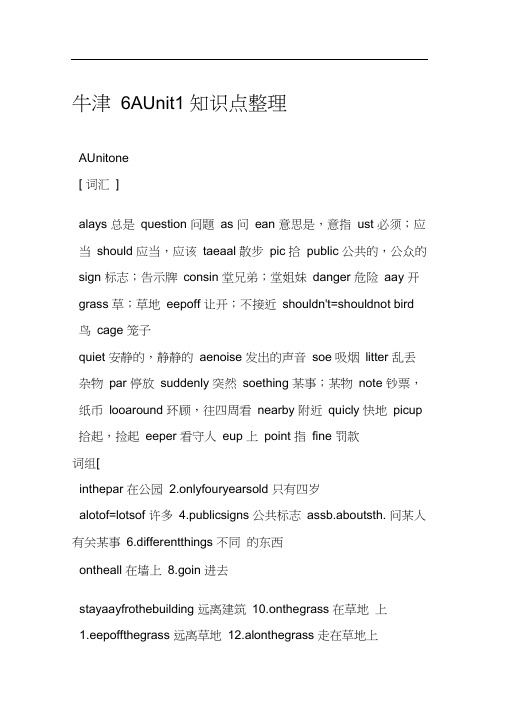
牛津6AUnit1 知识点整理AUnitone[ 词汇]alays 总是question 问题as 问ean 意思是,意指ust 必须;应当should 应当,应该taeaal 散步pic 拾public 公共的,公众的sign 标志;告示牌consin 堂兄弟;堂姐妹danger 危险aay 开grass 草;草地eepoff 让开;不接近shouldn't=shouldnot bird 鸟cage 笼子quiet 安静的,静静的aenoise 发出的声音soe 吸烟litter 乱丢杂物par 停放suddenly 突然soething 某事;某物note 钞票,纸币looaround 环顾,往四周看nearby 附近quicly 快地picup 拾起,捡起eeper 看守人eup 上point 指fine 罚款词组[inthepar 在公园2.onlyfouryearsold 只有四岁alotof=lotsof 许多4.publicsigns 公共标志assb.aboutsth. 问某人有关某事6.differentthings 不同的东西ontheall 在墙上8.goin 进去stayaayfrothebuilding 远离建筑10.onthegrass 在草地上1.eepoffthegrass 远离草地12.alonthegrass 走在草地上3.bequiet 安静14.aenoise 发出吵闹声noalotaboutsth. 对某事了解很多16.nosoing 禁止吸烟nolittering不准乱扔18.noparing 禁止停车Donottouch. 不准触碰。
20.noeatingordrining 此处禁止吃喝1.taeaal 散步22.aten-yuannote 一张十元的纸币3」ooaround 环顾四周24.alto …朝...... 走过去picup 捡起,拾起26.apareeper 一个公园管理员eupto …朝……走过来28.pointto …指向……saytosb. 对某人说30.overthere 那边,那里fine ¥ 10罚款10元32.givesb.sth. 给某人某物3.tryagain 在试一次重难点解析[ jacisonlyfouryearsoldbuthealayshasalotofquestions. 杰克只有四岁,但他总是有许多的问题。
牛津沪教版六年级上6AUnit1-Unit2 重要知识点复习
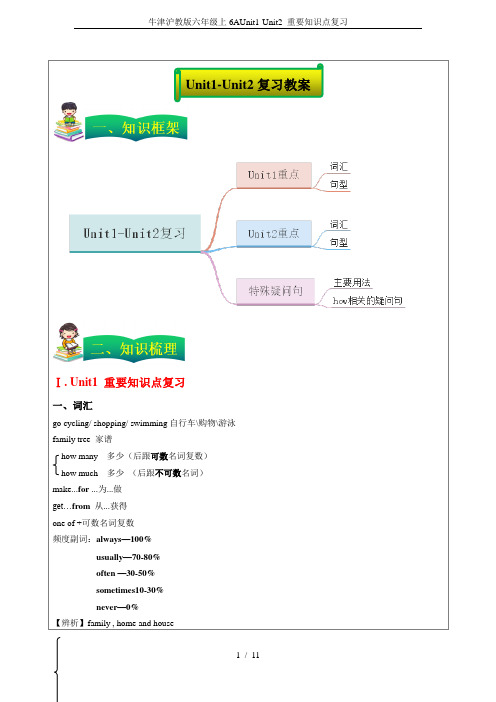
Unit1-Unit2复习教案Ⅰ. Unit1 重要知识点复习一、词汇go cycling/ shopping/ swimming自行车\购物\游泳family tree 家谱how many 多少(后跟可数名词复数)how much 多少(后跟不可数名词)make...for ...为...做get…from从...获得one of +可数名词复数频度副词:always—100%usually—70-80%often —30-50%sometimes10-30%never—0%【辨析】family , home and housefamily:“ 家、家庭、家人”。
作主语时,如果强调的是家庭成员,谓语动词用复数;如果强调的是一个家庭,则谓语动词用单数。
family tree 家谱home "家",指同家人共同生活,居住的地方,特别强调家里的氛围和环境,不一定含有建筑的意思,带有感情色彩的词。
如:hometown 故乡...house“住宅”、“房子”,指居住的房屋,建筑物。
二、语法和重点句型1. 用This is ... /These are ...来介绍家人。
二者都表示近指,“This is .. . ”后跟单数名词,“These are ...” 后跟复数名词或者多个不同的对象。
2.用how many 来询问数量后接可数名词的复数形式,当我们提问你有多少……时候,如果How many后跟人,常用how many... do you have?如果How many 后跟物,常用how many...have you got?3.What do you do with your... ? 和What else do you do with your... ? 来提问与家庭成员或亲戚一起做什么.else 意为别的其他的,常用于特殊疑问词或不定式之后,如what else, something else等。
牛津英语6A模块单元知识点总结
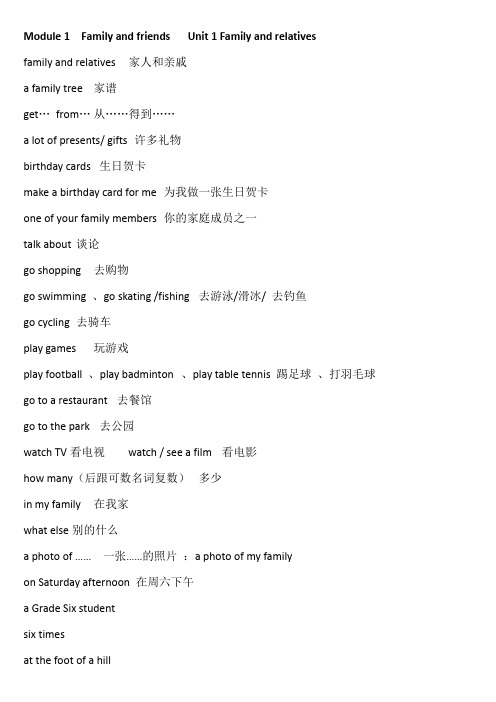
Module 1 Family and friends Unit 1 Family and relativesfamily and relatives 家人和亲戚a family tree 家谱get…from…从……得到……a lot of presents/ gifts 许多礼物birthday cards 生日贺卡make a birthday card for me 为我做一张生日贺卡one of your family members 你的家庭成员之一talk about 谈论go shopping 去购物go swimming 、go skating /fishing 去游泳/滑冰/ 去钓鱼go cycling 去骑车play games 玩游戏play football 、play badminton 、play table tennis 踢足球、打羽毛球go to a restaurant 去餐馆go to the park 去公园watch TV看电视watch / see a film 看电影how many(后跟可数名词复数)多少in my family 在我家what else别的什么a photo of ……一张……的照片:a photo of my familyon Saturday afternoon 在周六下午a Grade Six studentsix timesat the foot of a hillthis --- these ; that --- those;parents , daughter, son, uncle, aunt频率副词:always 、usually、often、sometimes、never 在be动词后,助动词后,情态动词后,实义动词Also “也”,用于句中;too“也”,用于句末;A lot of = lots of “许多,大量”,修饰可数名词复数、不可数名词Eg. a lot of / lots of water ; a lot of / lots of apples;。
牛津6A知识点复习
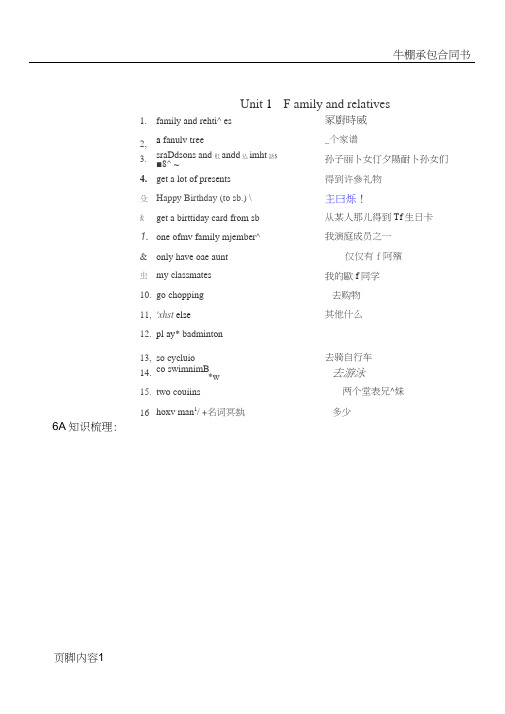
牛棚承包合同书页脚内容1Unit 1 F amily and relatives1. family and rehti^ es 冢廚時威2, a fanulv tree _个家谱3.sraDdsons and 肛andd込imht話$■8^ ~孙子丽卜女仃夕陽耐卜孙女们4.get a lot of presents 得到许參礼物殳Happy Birthday (to sb.) \主曰烁!&get a birttiday card from sb 从某人那儿得到Tf生日卡1.one ofmv family mjember^ 我演庭成员之一&only have oae aunt 仅仅有f阿殯虫my classmates 我的歐f同学10.go chopping 去购物11,'xhst else其他什么12.pl ay* badminton13,so cycluio 去骑自行车14. co swimnimB *w 去游泳15.two couiins 两个堂表兄^妹16hoxv man1/ +名词冥埶多少6A知识梳理:牛棚承包合同书语言点1. This is my grandfather.®是我的(外)祖父。
These are my lam ily and relatives.这些是我的家人和亲戚■>注意句中各成分保持单复数同形,2. T m their son.,我是他们的儿子&We:T re their sons.们杲他们的儿子*3. How many uncles do you hzx?你有多少个叔叔?How rn^y后面接可数名词的复数形式o4. What do you do with your...?你和你的”干什么?5. What else- do 丫口u do with your»?你和你的”还干什么?6. What else do you do with your»?你^你的”还干什么?With是个介词.后面接人称代词时!要用宾格的形式。
牛津6A Unit 1知识点整理

牛津6A Unit 1知识点整理1.1 运动类名词的单复数形式在英语中,运动类名词的单复数形式有一定的规律。
以下是一些常见运动类名词的单复数形式:•football(足球):单数形式为football,复数形式为footballs。
•basketball(篮球):单数形式为basketball,复数形式为basketballs。
•tennis(网球):单数形式为tennis,复数形式为tennises。
•swimming(游泳):单数形式为swimming,复数形式为swimmings。
•running(跑步):单数形式为running,复数形式为runnings。
需要注意的是,有些运动类名词的复数形式并不是通过在单数形式后面加s来构成,因此在学习和使用过程中需要注意这些特殊形式。
1.2 运动的介词短语运动类动词常常与特定的介词搭配使用,构成介词短语。
以下是一些常见的运动介词短语:•play football(踢足球)•play basketball(打篮球)•go swimming(去游泳)•go running(去跑步)•do gymnastics(做体操)这些介词短语为我们描述运动提供了一种简单而准确的表达方式,因此在进行运动描述时,我们需要掌握这些常用的介词搭配。
1.3 描述运动的形容词在描述运动时,我们经常使用一些形容词来表达运动的特性或效果。
以下是一些常见的描述运动的形容词:•fast(快速的)•slow(慢的)•intense(强烈的)•gentle(温和的)•strenuous(艰苦的)这些形容词能够帮助我们更准确地描述运动的特点,使我们的表达更加具体生动。
1.4 运动时的时间副词在描述运动时,有时我们需要使用时间副词来说明运动的频率或持续时间。
以下是一些常见的描述运动时的时间副词:•often(经常)•usually(通常)•sometimes(有时候)•always(总是)•for hours(几个小时)这些时间副词可以帮助我们更准确地描述运动的时间要素,使我们的表达更加完整。
牛津小学英语6A Unit 1 Public signs 单元重点归纳
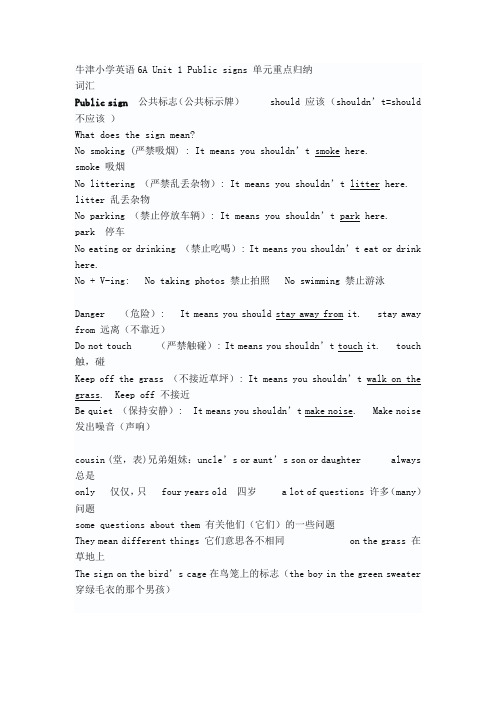
牛津小学英语6A Unit 1 Public signs 单元重点归纳词汇Public sign公共标志(公共标示牌) should 应该(shouldn’t=should不应该)What does the sign mean?No smoking (严禁吸烟) : It means you shouldn’t smoke here. smoke 吸烟No littering (严禁乱丢杂物): It means you shouldn’t litter here. litter 乱丢杂物No parking (禁止停放车辆): It means you shouldn’t park here. park 停车No eating or drinking (禁止吃喝): It means you shouldn’t eat or drink here.No + V-ing: No taking photos 禁止拍照 No swimming 禁止游泳Danger (危险): It means you should stay away from it. stay awayfrom 远离(不靠近)Do not touch (严禁触碰): It means you shouldn’t touch it. touch 触,碰Keep off the grass (不接近草坪): It means you shouldn’t walk on the grass. Keep off 不接近Be quiet (保持安静): It means you shouldn’t make noise. Make noise发出噪音(声响)cousin (堂,表)兄弟姐妹:uncle’s or aunt’s son or daughter always总是only 仅仅,只 four years old 四岁 a lot of questions 许多(many)问题some questions about them 有关他们(它们)的一些问题They mean different things 它们意思各不相同 on the grass 在草地上The sign on the bird’s cage在鸟笼上的标志(the boy in the green sweater穿绿毛衣的那个男孩)know a lot about public signs 对标牌了解很多(了解,知道有关很多标志的事)take a walk 散步 walk to the note 走到纸币跟前 come up to him 来到他跟前say to Mr. Smith 对史密斯先生说 fine ¥10 罚款10 元pick 捡 pick it up 捡起它(it, them 放中间)around 在….周围 Look around 环顾四周 There are some public signs around the river.point 指着 point to a sign on the grass 指着草地上的一个标志Can’t you see the sign over there, sir? 先生,你难道没看见那边的标牌吗?play the game with your friends 和你的朋友玩这个游戏suddenly 突然地 nearby 附近地(副词)quickly 快地 keeper 看守人On the Internet 在网上 learn more about public signs 学更多有关公共标志的知识Talk about the sign with a partner. 找个伙伴谈论标志 conversation 谈话As a model 作为一个样子(模型) correct words 正确的单词二、部分语言点札记1 always 总是 always > usually > often > sometimesThis boy is always late for school. 这个男孩总是上学迟到。
沪教版牛津小学英语6A-Module1-Unit2-period1
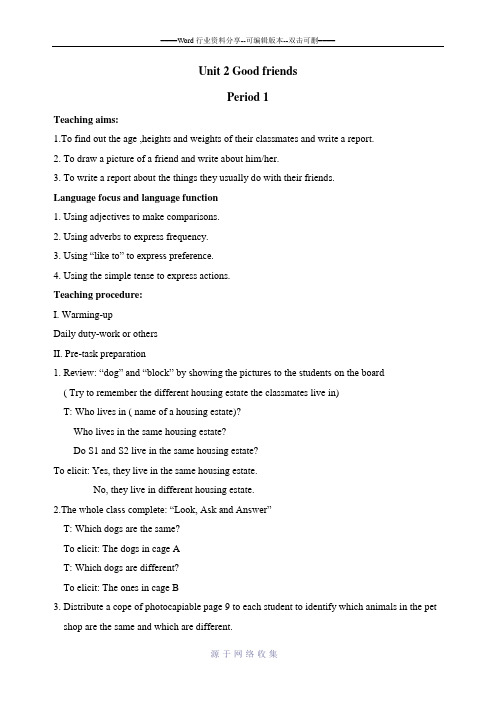
Unit 2 Good friendsPeriod 1Teaching aims:1.To find out the age ,heights and weights of their classmates and write a report.2. To draw a picture of a friend and write about him/her.3. To write a report about the things they usually do with their friends.Language focus and language function1. Using adjectives to make comparisons.2. Using adverbs to express frequency.3. Using “like to” to express preference.4. Using the simple tense to express actions.Teaching procedure:I. Warming-upDaily duty-work or othersII. Pre-task preparation1. Review: “dog” and “block” by showing the pictures to the students on the board( Try to remember the different housing estate the classmates live in)T: Who lives in ( name of a housing estate)?Who lives in the same housing estate?Do S1 and S2 live in the same housing estate?To elicit: Yes, they live in the same housing estate.No, they live in different housing estate.2.The whole class complete: “Look, Ask and Answer”T: Which dogs are the same?To elicit: The dogs in cage AT: Which dogs are different?To elicit: The ones in cage B3. Distribute a cope of photocapiable page 9 to each student to identify which animals in the pet shop are the same and which are different.III. While-task procedure1. Play the recording: Look and Read Students listen and follow in their books.2. Play the recording again Students listen and repeat3. Give the students a few minutes to read the passage silently.4. Ask the students to read the five sentences in Answer True/false.5. Tell the students to close their booksT: Who is your good friend?How old is he/she?What do you like to do together?To elicit: _________is my good friend. He /She is _______ yeas old. We always /usually /sometimes ________ together.6. Distribute a copy of Photocopiable page 10 to each student to tick the things they and theirfriends do together. Then they write them in complete sentencesIV. Consolidation:Grammar practice Book A Page 4-5.。
牛津6A Unit 1知识点整理
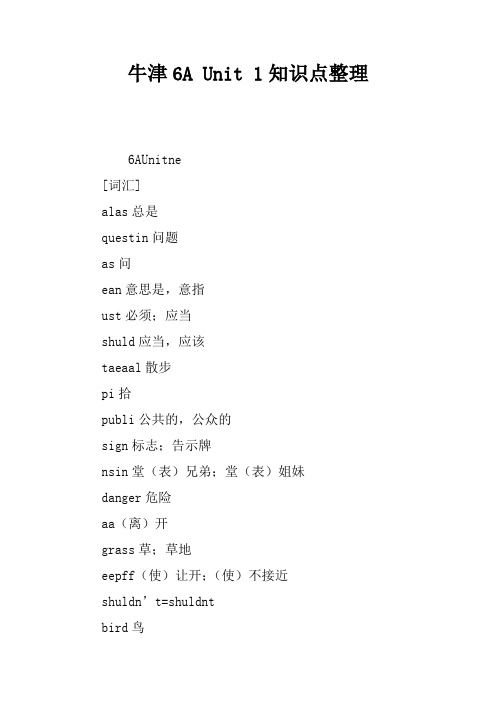
牛津6A Unit 1知识点整理6AUnitne[词汇]alas总是questin问题as问ean意思是,意指ust必须;应当shuld应当,应该taeaal散步pi拾publi公共的,公众的sign标志;告示牌nsin堂(表)兄弟;堂(表)姐妹danger危险aa(离)开grass草;草地eepff(使)让开;(使)不接近shuldn’t=shuldntbird鸟age笼子quiet安静的,静静的aenise发出(喧闹)的声音se吸烟litter乱丢杂物par停放(车辆等)suddenl突然(地)sething某事;某物nte钞票,纸币larund环顾,往四周看nearb附近(的)quil快地piup拾起,捡起eeper看守人eup上来pint指fine罚款[词组]inthepar在公园2nlfurearsld只有四岁3altf=ltsf许多4publisigns公共标志assbabutsth问某人有关某事6differentthings不同的东西7ntheall在墙上8gin进去9staaafrthebuilding远离建筑0nthegrass在草地上1eepffthegrass远离草地2alnthegrass走在草地上3bequiet安静4aenise发出吵闹声naltabutsth对某事了解很多6nsing禁止吸烟7nlittering不准乱扔8nparing禁止停车9Dnttuh不准触碰。
20neatingrdrining此处禁止吃喝21taeaal散步22aten-uannte一张十元的纸币23larund环顾四周24alt…朝……走过去2piup捡起,拾起26apareeper一个公园管理员27eupt…朝……走过来28pintt…指向……29satsb对某人说30verthere那边,那里31fine¥10罚款10元32givesbsth给某人某物33tragain在试一次[重难点解析]aisnlfurearsldbuthealashasaltfquestins杰克只有四岁,但他总是有许多的问题。
牛津6A Unit 1知识点整理(通用3篇)
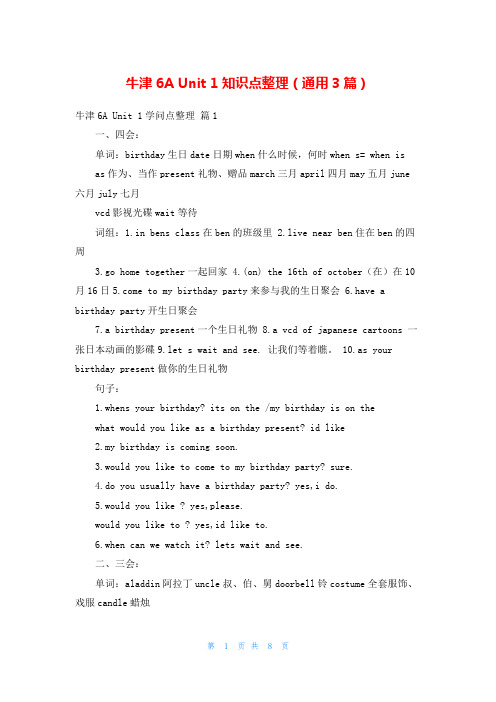
牛津6A Unit 1知识点整理(通用3篇)牛津6A Unit 1学问点整理篇1一、四会:单词:birthday生日date日期when什么时候,何时when s= when is as作为、当作present礼物、赠品march三月april四月may五月june 六月july七月vcd影视光碟wait等待词组:1.in bens class在ben的班级里 2.live near ben住在ben的四周3.go home together一起回家4.(on) the 16th of october(在)在10月16日e to my birthday party来参与我的生日聚会6.have a birthday party开生日聚会7.a birthday present一个生日礼物 8.a vcd of japanese cartoons 一张日本动画的影碟9.let s wait and see. 让我们等着瞧。
10.as your birthday present做你的生日礼物句子:1.whens your birthday? its on the /my birthday is on thewhat would you like as a birthday present? id like2.my birthday is coming soon.3.would you like to come to my birthday party? sure.4.do you usually have a birthday party? yes,i do.5.would you like ? yes,please.would you like to ? yes,id like to.6.when can we watch it? lets wait and see.二、三会:单词:aladdin阿拉丁uncle叔、伯、舅doorbell铃costume全套服饰、戏服candle蜡烛january一月february二月august八月september九月october十月november十一月december十二月first第一second其次third第三fourth第四fifth第五sixth第六twelfth第十二twentieth其次十twenty-first其次十一词组:1.have a cake with lots of strawberries吃一块草莓蛋糕2.happy birthday to you!祝你生日欢乐3.take off脱下take off his costume脱下戏装4.blow out吹灭blow out the candles吹灭蜡烛5.open the door开门句子:1.the doorbell is ringing.2.he is giving ben some cartoons as a birthday present.3.ben is blowing out the candles on the cake.its time for some cake.三、语音:/ / dear hear near year牛津6a unit 2学问点整理来自第一。
牛津中小学英语六年级上册 第二单元知识点整理

译林6A Unit 2知识点整理一、单词(见书后92页)二、词组:1. 骑车去公园go to the park by bike= ride to the park2. 鹦鹉表演 a parrot show3.一个有趣的鹦鹉an interesting parrot4. 变得有风且多云become windy and cloudy5.高高地放飞风筝fly kites high6. 在天空中in the sky7.带来一些饺子bring some dumplings 8. 一些面包和蜂蜜some bread and honey 9.一些饮料some drink s10. 一些蜜蜂some bees11.看见一些蚂蚁在面包和蜂蜜上see some ants on the bread and honey12.乌云密布black cloud s 13. 一些白云some white clouds14.天下起了雨。
It rained. 15. 又饥饿又潮湿hungry and wet16.整天all day 17. 带午饭到公园bring lunch to the park 18.取三张卡片pick three cards 19. 在操场上打篮球play basketball in the playground 20.干得好well done 21. 遇见Bobby meet Bobby22.看起来伤心look sad 23. 怎么了?What’s the matter?24.丢失了我的新风筝lose my new kite 25. 想知道为什么want to know why26.出什么事了?What happened? 27. 放我的新风筝fly my new kite28.爬上山climb up the hill 29. 飞得太高fly too high30.抓紧风筝hold onto the kite 31. 飞走fly away32.为什么你有它?Why do you have it? 33. 在山边发现它find it near the hill34.在你的日记里in your diary 35. 去游泳go swimming36.看电影watch a film 37. 去野餐have a picnic38.做家务do the housework 39. 在星期一上午on Monday morning40.上周星期天last Sunday 41.(在)9月20日(on) the 20th of September三、句子41.这是怎样的一天啊What a day!42.这是有趣的一天啊What an interesting day!43.昨天天气怎么样?What was the weather like yesterday?44.昨天天气晴朗。
译林牛津英语6A学习知识重点汇总
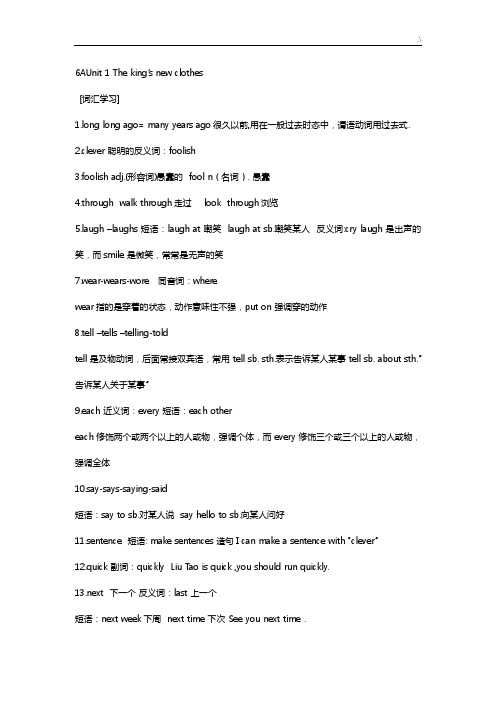
6AUnit 1 The king’s new clothes[词汇学习]1.long long ago= many years ago很久以前,用在一般过去时态中,谓语动词用过去式.2.clever 聪明的反义词:foolish3.foolish adj.(形容词)愚蠢的 fool n(名词). 愚蠢4.through walk through走过 look through浏览ugh –laughs 短语:laugh at 嘲笑 laugh at sb.嘲笑某人反义词:cry laugh 是出声的笑,而smile 是微笑,常常是无声的笑7.wear-wears-wore 同音词:wherewear指的是穿着的状态,动作意味性不强,put on 强调穿的动作8.tell –tells –telling-toldtell是及物动词,后面常接双宾语,常用tell sb. sth.表示告诉某人某事 tell sb. about sth.”告诉某人关于某事”9.each 近义词:every 短语:each othereach修饰两个或两个以上的人或物,强调个体,而every修饰三个或三个以上的人或物,强调全体10.say-says-saying-said短语:say to sb.对某人说 say hello to sb.向某人问好11.sentence 短语: make sentences 造句I can make a sentence with “clever”12.quick 副词:quickly Liu Tao is quick ,you should run quickly.13.next 下一个反义词:last 上一个短语:next week下周 next time 下次 See you next time .14.little 小的,年幼的反义词:big 近义词:small15.think –thinks –thinking-thought 短语:think of想起 think hard 认真思考16.child复数:children 短语:Children’s Day儿童节 the only child 唯一的孩子17. turn to 变成 Water turned into ice at last.短语归纳Story timelong long ago 很久以前 new clothes 新衣服 one day 一天make…..for……为…….制作…… try on试穿 clever people聪明的人foolish people愚蠢的人 walk through走过 a lot of people 许多人in the street 在街道上 beautiful clothes漂亮的衣服 a little boy 一个小男孩 point at指着…….. Cartoon timeplay a game 玩游戏 tell a story 讲故事 each student 每个学生on the mountain 在山上 the next sentence 下一句 an old man 一位老人live in 居住在 think hard 认真思考 have to 不得不Grammar time一般过去式的用法1. 一般过去式的概念:表示在过去某个时间发生的动作或状态,常与表示过去的时间状语连用。
牛津6A知识点复习
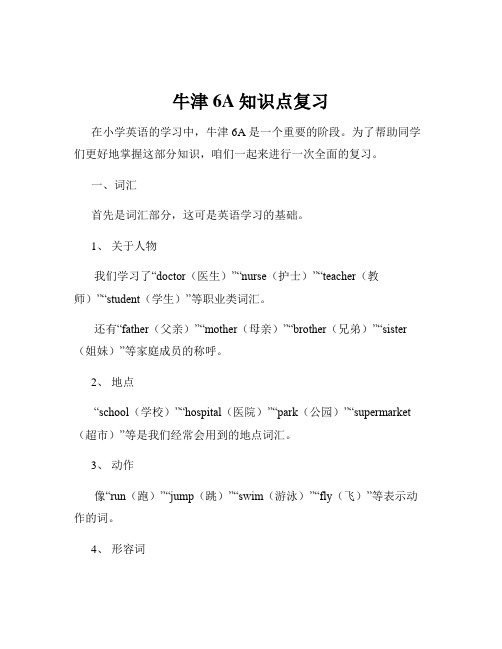
牛津6A知识点复习在小学英语的学习中,牛津 6A 是一个重要的阶段。
为了帮助同学们更好地掌握这部分知识,咱们一起来进行一次全面的复习。
一、词汇首先是词汇部分,这可是英语学习的基础。
1、关于人物我们学习了“doctor(医生)”“nurse(护士)”“teacher(教师)”“student(学生)”等职业类词汇。
还有“father(父亲)”“mother(母亲)”“brother(兄弟)”“sister (姐妹)”等家庭成员的称呼。
2、地点“school(学校)”“hospital(医院)”“park(公园)”“supermarket (超市)”等是我们经常会用到的地点词汇。
3、动作像“run(跑)”“jump(跳)”“swim(游泳)”“fly(飞)”等表示动作的词。
4、形容词“big(大的)”“small(小的)”“tall(高的)”“short(矮的)”“fat (胖的)”“thin(瘦的)”等形容词可以用来描述事物的特征。
要记住这些词汇,不能死记硬背,可以通过图片、句子或者实际场景来帮助记忆。
二、语法语法是英语学习中的重点和难点。
1、一般现在时这是我们经常会用到的时态,表示经常发生的动作或存在的状态。
比如:“I go to school every day(我每天去上学。
)” 主语是第三人称单数时,动词要发生变化,像“He likes playing football(他喜欢踢足球。
)”中的“like”就要变成“likes”。
2、现在进行时表示正在进行的动作,结构是“be +动词的现在分词”。
例如:“I am reading a book now(我现在正在读书。
)”3、一般过去时用来描述过去发生的事情,动词要用过去式。
像“I went to Beijing last year(我去年去了北京。
)”4、名词的单复数一般情况下,直接在名词后面加“s”,比如“book books”。
但有些名词的复数形式是不规则的,比如“man men”“woman women”“child children”。
牛津6A知识点
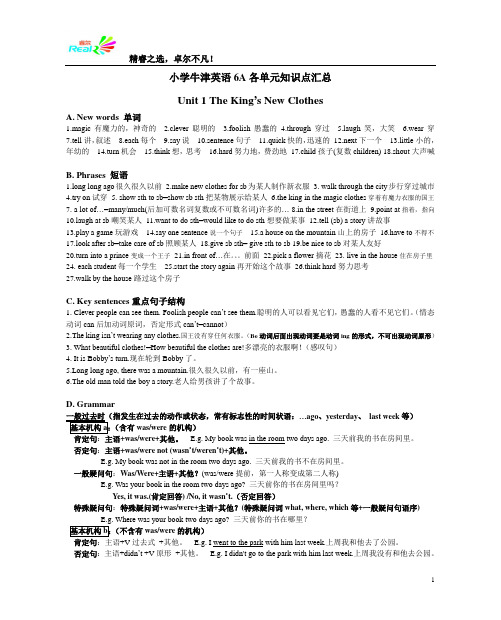
小学牛津英语6A各单元知识点汇总Unit 1 The King’s New ClothesA. New words 单词1.magic有魔力的,神奇的2.clever聪明的3.foolish愚蠢的4.through穿过ugh笑,大笑6.wear穿7.tell讲,叙述8.each每个9.say说10.sentence句子11.quick快的,迅速的12.next下一个13.little小的,年幼的14.turn机会15.think想,思考16.hard努力地,费劲地17.child孩子(复数children) 18.shout大声喊B. Phrases 短语1.long long ago很久很久以前2.make new clothes for sb为某人制作新衣服3. walk through the city步行穿过城市4.try on试穿5. show sth to sb=show sb sth把某物展示给某人6.the king in the magic clothes穿着有魔力衣服的国王7. a lot of…=many/much(后加可数名词复数或不可数名词)许多的…8.in the street在街道上9.point at指着,指向ugh at sb嘲笑某人11.want to do sth=would like to do sth想要做某事12.tell (sb) a story讲故事13.play a game玩游戏14.say one sentence说一个句子15.a house on the mountain山上的房子16.have to不得不17.look after sb=take care of sb照顾某人18.give sb sth= give sth to sb 19.be nice to sb对某人友好20.turn into a prince变成一个王子21.in front of…在。
英语译林(牛津)版英语六年级(上册)知识点整理
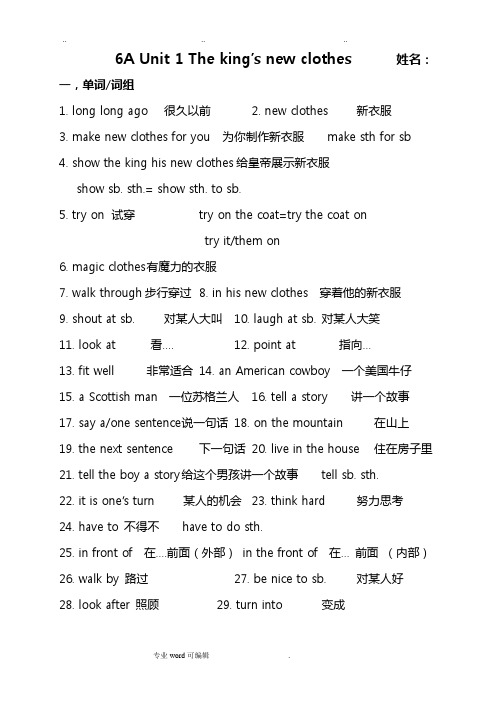
.. .. ..6A Unit 1 The king’s new clothes姓名:一,单词/词组1. long long ago 很久以前2. new clothes 新衣服3. make new clothes for you 为你制作新衣服make sth for sb4. show the king his new clothes给皇帝展示新衣服show sb. sth.= show sth. to sb.5. try on 试穿try on the coat=try the coat ontry it/them on6. magic clothes 有魔力的衣服7. walk through步行穿过8. in his new clothes 穿着他的新衣服9. shout at sb. 对某人大叫10. laugh at sb. 对某人大笑11. look at 看….12. point at 指向…13. fit well 非常适合14. an American cowboy 一个美国牛仔15. a Scottish man 一位苏格兰人16. tell a story 讲一个故事17. say a/one sentence 说一句话18. on the mountain 在山上19. the next sentence 下一句话20. live in the house 住在房子里21. tell the boy a story 给这个男孩讲一个故事tell sb. sth.22. it is one’s turn 某人的机会23. think hard 努力思考24. have to 不得不have to do sth.25. in front of 在….前面(外部)in the front of 在… 前面(内部)26. walk by 路过27. be nice to sb. 对某人好28. look after 照顾29. turn into 变成二,句型1. Long long ago, there was a king. 很久很久以前,有一位国王。
小学牛津英语6A知识点
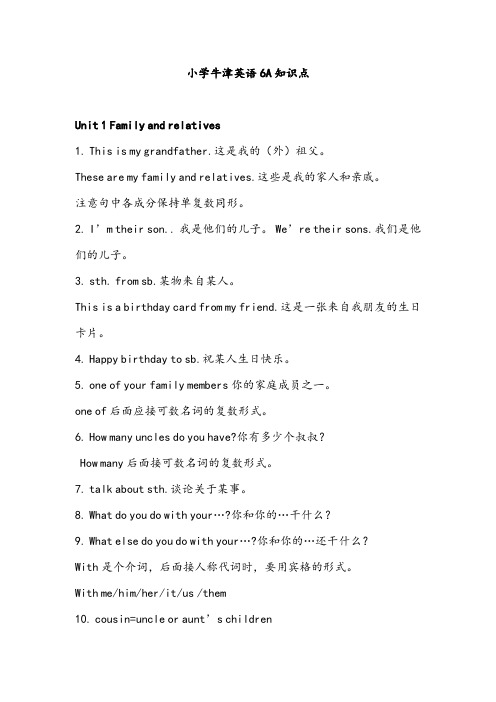
小学牛津英语6A知识点Unit1Family and relatives1.This is my grandfather.这是我的(外)祖父。
These are my family and relatives.这些是我的家人和亲戚。
注意句中各成分保持单复数同形。
2.I’m their son..我是他们的儿子。
We’re their sons.我们是他们的儿子。
3.sth.from sb.某物来自某人。
This is a birthday card from my friend.这是一张来自我朋友的生日卡片。
4.Happy birthday to sb.祝某人生日快乐。
5.one of your family members你的家庭成员之一。
one of后面应接可数名词的复数形式。
6.How many uncles do you have?你有多少个叔叔?How many后面接可数名词的复数形式。
7.talk about sth.谈论关于某事。
8.What do you do with your…?你和你的…干什么?9.What else do you do with your…?你和你的…还干什么?With是个介词,后面接人称代词时,要用宾格的形式。
With me/him/her/it/us/them10.cousin=uncle or aunt’s children11.always/sometimes/usually是频度副词,提问应该要用How often…?Unit2I have a good friend1.always/sometimes/usually/never是频度副词.在句中的位置是:放在行为动词的前面,放在be动词的后面。
也可以说“行前系后”。
She is always kind.她总是很善良的。
She always helps other people.她总是帮助其他人。
[牛津中小学英语网]6Aunit1,unit2知识点复习
![[牛津中小学英语网]6Aunit1,unit2知识点复习](https://img.taocdn.com/s3/m/678fc35310661ed9ac51f302.png)
[牛津中小学英语网]6A u n i t1,u n i t2知识点复习-CAL-FENGHAI.-(YICAI)-Company One11.写出下列单词聪明的:愚蠢的:大笑:指着:大叫:Story time1.There be 句型中be 动词填空1)be 动词有:注意点:先判断时态,一般现在时、现在进行时用一般过去时用was + 单数名词或不可数名词(water, juice, coffee, milk, tea, bread, rice)were +可数名词复数2)就近原则3)there be 不能和哪个单词连用?2.:为...做3.show sb sth=4.try on put on take off试穿鞋子:试穿他们5.these this that those6.in + on+人7.people:8.point at.cartoon time1.告诉某人某事给某人某物2.each的用法Each student says one sentence. 每个学生说一句话。
Each后面接名词,表示“每个……”,谓语动词(be动词或者行为动词)用形式3.turn的用法(1)It’s Bobby’s turn. 该轮到Bobby了。
turn 作名词,意为“轮流”“依次轮流的顺序”。
例如:轮到你了:轮到他们了:轮到我妈妈了:(2)向右转:4.have to 不得不 have to +5.Look after:课堂练习选择题1. Long long ago,there _______ a prince. A. is B. were C. was2. Let me make a puppet _____ you. A. with B. to C. for3. Mike _______ at the plate on the table .A. pointedB. pointsC. pointing4. There are a lot of ______ in the classroom.A. a peopleB. peoplesC. people5. ______ beautiful clothes!A. WhatB. What’sC. How6. Ben ofen _______ with his parents in the park after dinner .A. walkB. walkedC. walks7. Who can _______ clothes for me?A. makingB. makesC. make8. It is _______ turn.A. Helen’sB. HelenC. Helens9. The king isn’t wearing _______ clothes.A. aB. anyC. some10. The king walked through the city _______ his new clothes.A. try onB. wearC. in用所给单词的适当形式填空。
- 1、下载文档前请自行甄别文档内容的完整性,平台不提供额外的编辑、内容补充、找答案等附加服务。
- 2、"仅部分预览"的文档,不可在线预览部分如存在完整性等问题,可反馈申请退款(可完整预览的文档不适用该条件!)。
- 3、如文档侵犯您的权益,请联系客服反馈,我们会尽快为您处理(人工客服工作时间:9:00-18:30)。
11.写出下列单词2聪明的:愚蠢的:大笑:3指着:大叫:4Story time51.There be 句型中be 动词填空61)be 动词有: 7注意点:8先判断时态,一般现在时、现在进行时用9一般过去时用10was + 单数名词或不可数名词(water, juice, coffee, milk, tea, bread, 11rice)12were +可数名词复数132)就近原则143)there be 不能和哪个单词连用?152.:为...做163.show sb sth=174.try on put on take off18试穿鞋子:试穿他们195.these this that those206.in + on+人217.people:228.point at23.24cartoon time251.告诉某人某事26给某人某物272.each的用法28Each student says one sentence. 每个学生说一句话。
Each后面接名词,表示“每个……”,谓语动词(be动词或者行为动词)2930用形式313.turn的用法(1)It’s Bobby’s turn. 该轮到Bobby了。
3233turn 作名词,意为“轮流”“依次轮流的顺序”。
例如:34轮到你了:轮到他们了:轮到我妈妈了:35(2)向右转:364.have to 不得不 have to +375.Look after:38课堂练习39选择题401. Long long ago,there _______ a prince. A. is B.41were C. was422. Let me make a puppet _____ you. A. with B. to C.43for443. Mike _______ at the plate on the table .45A. pointedB. pointsC. pointing4. There are a lot of ______ in the classroom.4647A. a peopleB. peoplesC. people485. ______ beautiful clothes!49A. WhatB. What’sC. How506. Ben ofen _______ with his parents in the park after dinner .51A. walkB. walkedC. walks7. Who can _______ clothes for me?5253A. makingB. makesC. make548. It is _______ turn.A. Helen’sB. HelenC. Helens55569. The king isn’t wearing _______ clothes.57A. aB. anyC. some10. The king walked through the city _______ his new clothes.5859A. try onB. wearC. in60用所给单词的适当形式填空。
611. There ________ (be) some tigers here a year ago.622. Can you see _______(they)?633. Look at the two _______ (man) over there?644. Look! She’s ________(wear) a new cl othes.655. _______(this) are new pencils.666. An old woman _________(walk) by the house this morning.677. Can you give _________(I) your book?8. l look after _________(he) every day.68699. Long long ago, there ________(be) a king.7010. This is the ________(lion) house.71连词成句。
721. people, street, there, a, were, lot, in, of, the (.) 73________________________________________________________2. clothes, the, liked, king, the, new (.)7475__________________________________________________________763. king, a, little, pointed, boy, at, and, the, laughed (.)_________________________________________________________77784. me, can, make, you, the, clothes, new, for (?)79___________________________________________________________5. clothes, the, isn’t, a ny, king, wearing (.)8081__________________________________________________________8384Unit2851.天气状况86云:87雨:88太阳89风:90It often (rain) in summer.91It’s( rain) in spring in New York.922.写出下列单词的原形went: was: saw:9394became: flew: brought:95were: could: rained: took:963.去公园:去学校:回家:去那里:974.by bike=985.a parrot show:99show:作名词100作动词把某事展示给某人看:1021036.interesting:一个有趣的鹦鹉: interesting parrot 1047.weather:是否可数?1058.放风筝:1069.在空中10710.该吃午饭了:108是吃午饭的时间了:10911.bring和take的区别?11012.又饿又湿:11113.在几月几号用介词:in/on/at ?11214.对because的回答是:11315.干的好:11416.在操场上:115cartoon time1161.meet:1172.看起来伤心:看起来高兴:1183.what’s the matter=119你怎么了?:1204.want: =121想要做某事:1225.发生了什么?123然后发生了什么?1246.This morning:1257.too :1268.飞远了:1279.find 和look for的区别12810.near: 近义词:11.写出下列单词的过去式:129130Loss: happen: fly:131climb can: find:课堂练习132133用所给词的适当形式填空1341.Three days ago,I __________ (bring)a new bike.1352.I______ (live) with my grandparents when I was young.1363.The king _________ (not wear) any clothes that day,all the people 137__________(point)at him.1384.Long long ago,there_________ (be) many old men in the mountain. 1395.Look,the girl _______(wear) a nice dress.140选择正确答案。
141( )1. Long long ago, there a boy called Ma Liang.142A. wasB. wereC. isD. sre143( )2. I ________ TV a moment ago.144A. watchB. watchedC. lookedD. look145( )3. Tom visited the farm _______ his family yesterday.A. withB. forC. inD. and146147( )4. The teacher the blackboard,then we copyed the words. 148A.point atB. pointed atC.is pointing atD. 149points at150( )5. Do you want ________?151A. visit the forestB. visiting the forestC. to visiting the forestD. to visit the forest 152153( )6. Each student one picture.154A. drawB. drawsC. drawingD. to drawing( )7. She usually _______ new clothes his doll.155156A. makes…withB. make…forC. makes…forD. make…with 157( )8. The lion always walks ______ the forest every day.A. onB. underC. throughD. behind158159( )9. Were there ________ people in the street?A. someB. anyC. muchD. a 160161( )10. What ________ beautiful girl!162163。
